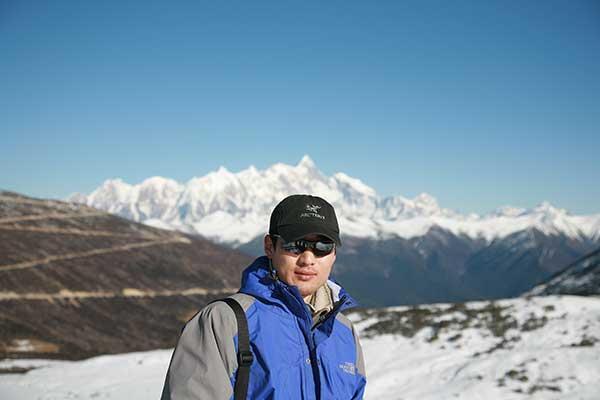Source:China Daily 2016-02-23

Xu Bin stands in front of Qomolangma in Tibet.[Photo/China Daily]
Ten years ago, Xu Bin was a 22-year-old student at the China Academy of Art, making his very first trip to the Tibet autonomous region to complete a painting project for school.
The trip by bus from his home in Northwest China's Gansu province took more than 48 hours and he roughed it the rest of the way. "Traveling was a big challenge as there was no railway access to Tibet in 2004, and I made my way across the whole region by backpacking, hitching rides and trekking," Xu said.
Two years after that first trip, Xu shifted from a career as a painter to information technology. But his interest in Tibet stayed constant. He set out to establish a tourism company to bring others to the land of the high plateau, where the average altitude towers above 4,000 meters.
With the world's highest mountain, the formidable Qomolangma, known as Mount Everest in the West, and the vast Changtang grassland, nearly as big as Western Europe in size, Tibet attracts visitors with its extremes. It's also home to more large animals than anywhere else in China, including the Tibetan antelope, wild yak and Tibetan brown bear.
In 2008, Xu founded the company, Yunduan Tourism Development. A year later, his website catering to independent travel, www.haixizang.com, came online to provide advice for travelers on where to eat, stay and see the sights.
Xu is tapping into a surge of interest in travel to Tibet and recent efforts by the central and the regional governments to turn Lhasa into a world-class tourism city.
During the opening ceremony of Tibet's international tourism and culture expo in September, Li Shihong, deputy head of the China National Tourism Administration, stressed the importance of nurturing Tibetan tourism as an important gateway to Southwest China.
"Tourism is one of Tibet's pillar industries and accounts for 20 percent of the region's economic contribution, and it has become the main channel of Tibet's opening up," Li said.
Xu enjoys working in Tibet, and he travels frequently between the region and other provinces. "I can concentrate on work in Tibet. I love the sunshine there. I always miss Tibet when I am not there," Xu said.
To cater to tourists, Xu opened a self-designed hostel. He spent a year on the design, and three years on the interior decor.
"I tried to run a hostel 10 years ago. I tasted many failures due to inexperience," Xu said. "Finding a house is not easy. I wanted to find an old house with sense of design."
Xu's friend Meng Fanhua said the time Xu spent perfecting the comfortable hostel was worth the wait. "The hostel is an old house with all walls painted white and the original figures preserved," Meng said. "It just feels like renovation mixed with modern patterns."
As Xu often travels, he relies on his trusted employees to keep the businesses running smoothly.
"He is ambitious and an ideas man, a man we want to learn many things from," said Gu Zhigang, 45, general manager of the tourism company. "He is good boss, because he doesn't only thinks to make a fortune for himself. He supports the members of his staff by paying their insurance contributions."
Xu remains ambitious. Next, he plans to create a self-driving tour club in Lhasa.
"I have never thought about success and failure before a new thing was started. I just wanted to do a good job with the work in my hands," Xu said. "It's not only about making money. Doing a good job is important as well."
Copyright © Xizang Daily & China Xizang News All rights reserved
Reproduction in whole or in part without permissions prohibited
Index Code: 藏 ICP 备 05000021 号
Producer: Xizang Daily International Communication Center